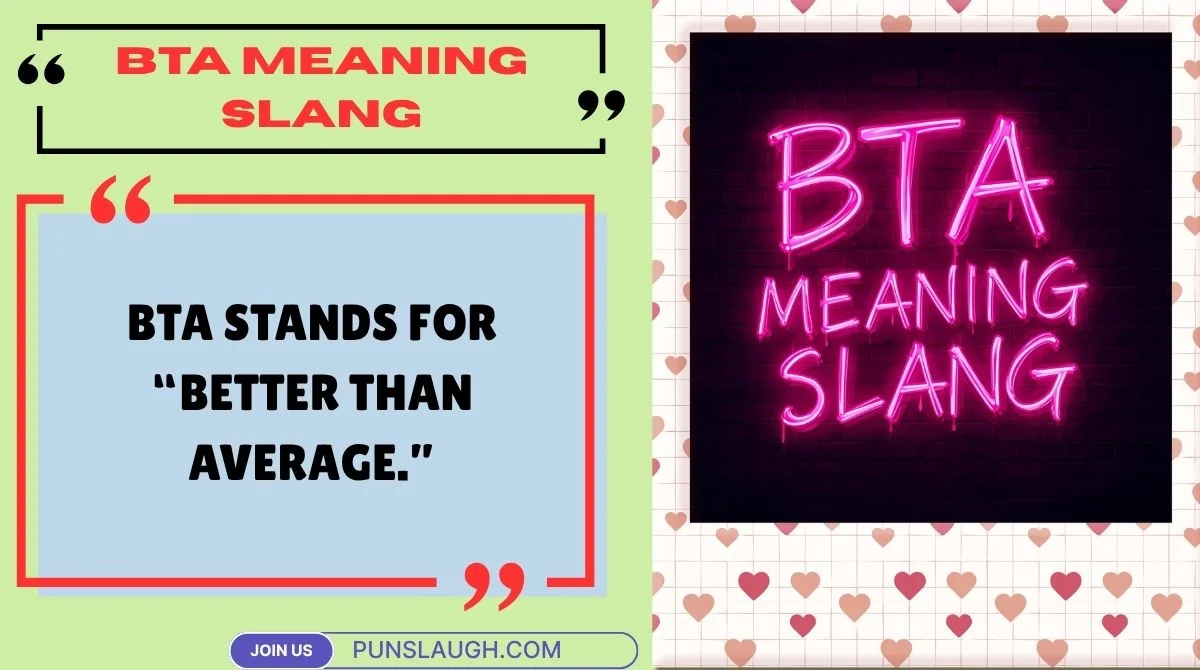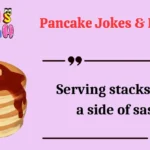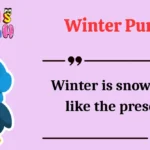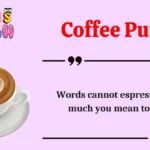Slang changes how we talk, text, and connect online.
One of the simplest yet surprisingly versatile slang terms you’ll see everywhere is BTA.
If you’ve scrolled through a tweet, spotted it in a comment section, or seen it pop up in a friend’s text, you might have wondered what it means.
This guide explains everything you need to know about the slang term BTA, from its origins to how to use it naturally.
What Does BTA Mean in Slang?
BTA stands for “Better Than Average.”
It’s a short, positive phrase used to compliment someone or something. You’ll find it in gaming chats, Instagram captions, reviews, and even in casual workplace messages.
Because it’s short, it fits perfectly into the fast-paced world of digital communication.
Here’s what makes BTA unique:
- Concise and direct: Two letters and a meaning that’s instantly clear.
- Casual tone: It’s rarely formal; it lives in the world of friendly comments and online chatter.
- Positive vibe: While it can be sarcastic, most of the time it praises something or someone.
“Her sense of humor is definitely BTA.”
That single phrase conveys approval without needing a long explanation.
Origin and Evolution of BTA
Slang rarely comes from one single source. BTA grew organically in online communities.
- Early use: It first appeared in online gaming forums and message boards in the late 2000s. Gamers used it to describe players with slightly above-average skills.
- Social media era: By the mid-2010s, the term started showing up on Twitter and Reddit, often in memes and casual discussions.
- Mainstream popularity: TikTok and Instagram pushed BTA into everyday language. It’s now common in captions, hashtags, and short video comments.
Unlike some slang that fades quickly, BTA stuck around because it’s neutral, versatile, and easy to type.
BTA in Texting & Social Media
BTA thrives in spaces where brevity matters. In digital conversations, every character counts.
Common ways you’ll see it:
- Direct compliments:
- “Your cooking skills are BTA!”
- “That new series is BTA, worth a.”
- Social media captions:
- “Weekend vibes = BTA.”
- Memes & hashtags:
- #BTA when hyping up a person, product, or event.
Tone plays a role. Sometimes it’s genuine praise, sometimes playful or teasing.
| Platform | How It’s Commonly Used | Typical Tone |
|---|---|---|
| Captions under selfies or travel pics | Playful, flattering | |
| TikTok | Comments on performance, trends | Casual, often humorous |
| Twitter / X | In reactions or hot takes | Sarcastic or positive |
| Gaming or hobby discussions | Neutral, descriptive |
Usage of BTA in Daily Conversations
Outside of social media, you’ll also see BTA in texts, chat apps, and casual email exchanges among friends or colleagues.
Typical contexts:
- Compliments:
“Your design presentation was BTA — everyone loved it.” - Reviews:
“The pizza here is BTA, but not quite the best.” - Self-description (playfully humble):
“Not a pro chef, but my pasta is definitely BTA.”
Appropriateness:
BTA is best used in casual or semi-casual settings.
It’s not suitable for academic papers, business proposals, or legal documents.
BTA vs. Similar Slang
To use BTA effectively, it helps to know what sets it apart from other slang.
| Slang Term | Meaning | Tone | When to Use |
|---|---|---|---|
| BTA | Better Than Average | Neutral-positive | General compliment, broad use |
| GOAT | Greatest of All Time | High praise | Extreme admiration |
| W | Win (something great) | Trendy positive | Celebrating success or achievement |
| Mid | Mediocre, average or below | Dismissive | To describe something unimpressive |
| Top-tier | Among the very best | Positive | Strong compliment for quality |
| Elite | Outstanding, exceptional | Very positive | For high-performing people or things |
👉 Key difference:
While terms like GOAT or Elite describe the best, BTA is milder praise — above average but not necessarily exceptional.
Examples of BTA in Sentences
Using BTA correctly makes your message feel natural.
Here are some common examples:
In Texting:
- “Your playlist is BTA — I added half of it to mine.”
- “His jokes are BTA, always cracks me up.”
In Social Media Captions:
- “Weekend brunch was BTA. 🥞✨”
- “Her performance tonight = BTA 👏”
In Reviews:
- “The movie’s visuals were BTA, but the plot felt slow.”
Misuse to Avoid:
❌ “The BTA weather ruined our plans.”
(Incorrect — BTA is generally positive, not for complaints.)
Global and Cultural Use of BTA
Slang often crosses borders, but it doesn’t always land the same way.
- English-speaking countries: US, UK, Canada, and Australia use BTA widely in informal contexts.
- Non-native speakers: Adopt BTA in gaming, pop culture discussions, or when mimicking American internet slang.
- Cultural interpretation: In some regions, BTA can sound overly casual or even dismissive. Context matters.
The rise of global meme culture means that slang like BTA travels faster than ever. Social platforms bridge these cultural gaps.
Why People Use BTA
There’s a reason short slang like BTA thrives online.
- Brevity: Saves time and character space.
- Positive spin: Offers mild praise without sounding exaggerated.
- Trend factor: Feels current and relatable among younger audiences.
- Social bonding: Shared slang helps people feel part of a group.
“Slang is like a secret handshake of digital communities — it signals belonging.”
Psychologically, users lean toward short, punchy phrases because they’re easier to recall and repeat.
Tips for Using BTA Correctly
To keep your slang game sharp, use BTA wisely.
Do:
- Use it in casual, friendly conversations.
- Pair it with context to make the meaning clear.
- Be mindful of tone — it can sound sarcastic in certain situations.
Don’t:
- Overuse it in professional or serious settings.
- Use it in contexts that require precision or detail (e.g., academic or technical writing).
- Assume everyone knows the meaning — slang can confuse those outside online culture.
Common Misconceptions & Debates Around BTA
Like many internet terms, BTA isn’t immune to confusion.
- Misinterpretation: Some confuse BTA with unrelated acronyms like “By the Amount” or “Business Travel Allowance.”
- Language debates: Critics argue slang like BTA oversimplifies communication. Supporters see it as proof of language adapting to new contexts.
- Mainstream adoption: BTA now appears in marketing copy, influencer captions, and brand hashtags — sparking debate over whether slang loses its edge once commercialized.
Related Slang and Acronyms
Here’s a quick-reference table of slang terms often seen alongside BTA:
| Slang Word | Meaning | Typical Context |
|---|---|---|
| W / L | Win or Loss | Gaming, sports, achievements |
| Mid | Mediocre | Pop culture reviews |
| Fire | Excellent, awesome | Music, food, entertainment |
| Slaps | Extremely good (esp. music) | Reviews, music culture |
| Peak | The highest point / best | Performance, moments |
These words often intermix in tweets, captions, and casual conversations, creating a shared slang ecosystem.
Frequently Asked Questions About BTA Meaning Slang
What does BTA mean in slang?
BTA means “Better Than Average”, used to describe someone or something slightly above the norm in a positive way.
Is BTA a compliment?
Yes. It usually conveys mild praise. However, in certain contexts it can be sarcastic.
When did BTA become popular?
BTA emerged in the late 2000s in gaming communities and became mainstream with the rise of social media platforms like Twitter and TikTok.
Can I use BTA in professional settings?
It’s best to avoid BTA in strictly professional or formal environments. Use it in casual team chats or informal digital spaces.
How is BTA different from GOAT or Elite?
GOAT and Elite imply exceptional or top-tier quality. BTA is a step above average but not at the very top.
Conclusion: BTA in Today’s Digital Lingo
BTA is more than just another acronym; it reflects how language adapts to the fast, casual pace of online communication.
It’s positive, flexible, and easy to use, making it a favorite among social media users and digital natives.
By understanding its meaning, origins, and nuances, you can use BTA with confidence — whether to give a friend a quick compliment or drop a snappy remark in a comment thread.





